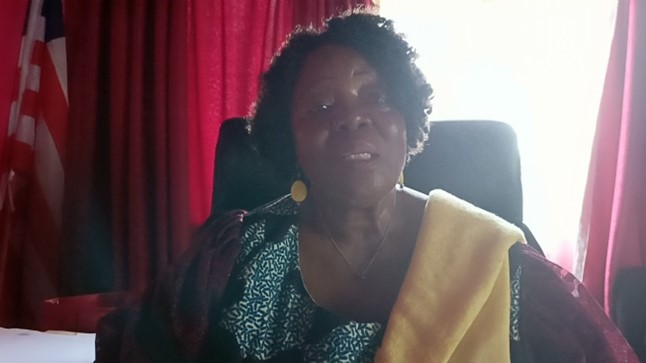Dr. Nancy T. Freeman, Principal of the Booker T. Washington Institute (BWI), a prominent vocational training institution in Liberia, has appealed to President Joseph Nyuma Boakai for urgent intervention to address critical challenges hindering the institution’s effectiveness. Speaking at the 2024 National Agriculture Fair held on BWI’s main campus in Margibi County, Dr. Freeman highlighted several pressing issues, including inadequate budgetary allocations, logistical constraints, and a dire need for modern equipment and infrastructure upgrades, particularly within the agricultural department.
One of the most significant concerns raised by Dr. Freeman was the stark contrast between the institution’s reliance on outdated agricultural tools and the advancements in modern agricultural technology. She lamented the continued use of cutlasses and hoes in the 21st century, emphasizing the urgent need for modern machinery such as power tillers, tractors, and motorbikes. This reliance on manual labor, she argued, not only slows down the training process but also deprives students of crucial exposure to contemporary agricultural practices and technologies, ultimately hindering their preparedness for the modern agricultural landscape. This deficiency in practical training equipment significantly limits the hands-on experience necessary for students to thrive in the agricultural sector.
Beyond the lack of modern equipment, Dr. Freeman also pointed to infrastructural limitations within the agricultural department, noting that the existing instructional areas are insufficient both in size and equipment to effectively cater to the growing student population. This includes two unequipped classrooms and a soil laboratory, further hindering the quality of education provided. She underscored the importance of practical training in agriculture, estimating it to constitute 60-65% of the curriculum, and stressed the urgent need for expansion and modernization to accommodate the increasing number of students pursuing agricultural studies.
The principal’s concerns extended beyond the agricultural department. She highlighted the logistical challenge of transporting goods and services to the institution due to a lack of mobility, impacting the smooth operation of BWI. Furthermore, the movement of staff and students, particularly during periods when senior students are undertaking job training, presents another significant logistical hurdle. Dr. Freeman also revealed that seven trade shops at the institution require significant intervention to ensure their continued functionality.
Despite these challenges, Dr. Freeman acknowledged and expressed gratitude for the invaluable support received from international partners, which has proven crucial in sustaining several of BWI’s trade shops. She recognized the contributions of the United States, the European Union through UNIDO, Youth Rising, the Swedish government, and the French International Organization (IECD). These partnerships have been instrumental in refurbishing and equipping key trade shops, including automotive, carpentry, electrical, and machinery, with state-of-the-art equipment. The EU, through UNIDO, has also played a crucial role in revitalizing the TVET building, which now serves as a training center for trainers from various TVET schools across the country.
Recent support from the IECD has included the provision of a modern block-making mixer and accessories for the Masonry Section of the General Building Trade Department, with plans underway for the IECD to expand the Domestic Science Department. These contributions from international partners underscore the vital role of external support in maintaining and upgrading BWI’s facilities.
Dr. Freeman’s appeal to President Boakai and her previous communication with Agriculture Minister Dr. J. Alexander Nuetah highlight the urgency of the situation and the need for government intervention to complement the support received from international partners. Addressing the highlighted challenges, particularly the acquisition of essential agricultural equipment and the expansion of the agricultural department’s facilities, is crucial for ensuring that BWI can effectively fulfill its mission of providing quality technical and vocational education to Liberian youth, equipping them with the necessary skills to contribute meaningfully to the nation’s development, particularly in the critical agricultural sector. By investing in BWI, the government can contribute significantly to the development of a skilled workforce capable of driving economic growth and progress in Liberia. The modernization of BWI’s agricultural program is not only essential for the institution’s success but also for the advancement of the agricultural sector in Liberia as a whole.


